|
|
 |
Bridging the Digital Divide At the second United Nations World Summit on the Information Society (WSIS) in Tunis in November 2005, representatives of governments, civil society and the private business sector discussed solutions to bridge the “digital divide” - the unequal access of the developed and underdeveloped world to Information and Communication Technology (ICT).
Development experts believe that the Internet in particular, could be a tool for development.
(By Christiane Kaess)
Chris Kabawato knows what he is talking about when he describes the digital divide:
“You sit in newsrooms, where it’s only the editor of a newspaper who has access to the Internet. How can a journalist work without access to the Internet in this day and age?” 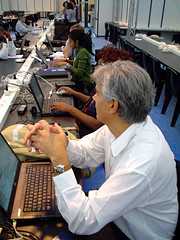 | | HANA at work in the WSIS Media Centre |
Kabwato is the Director of Highway Africa, which includes a news agency that is to some extent, an outcome of the first WSIS in Geneva in 2003. Students from Rhodes University in South Africa were sent to cover the first worldwide meeting on the information society.
After the summit, the Grahamstown-based team continued reporting on ICT issues in Africa via the Internet. The project has been quite successful and Highway Africa aims to have correspondents all over the continent during the course of this year.
What sets Highway Africa aside from its counterparts is the fact that the news organisation creates its own content. “We encourage our journalists to have personal blogs and on our website there are links to these blogs,” Kabwato explains (see Audio: Interview Chris Kabwato). In this way, Highway Africa combines two important elements for bridging the digital divide: The news agency brings ICT closer to people and at the same time creates opportunities for African journalists to cover their own stories.
The fact that African journalists are reporting on events in their motherland is quite a feat considering that for centuries, overseas journalists reported on African issues. This feat, and the work that Highway Africa is doing, could in part be credited to the Tunis Summit and the work that NGOs and civil society has done.
A huge task for civil society
Tracey Naughton, a South African media consultant, chaired the civil society’s media caucus in Tunis. She is positive about the outcomes of the Summit, which were recorded in the Tunis Commitment and the Tunis Agenda. Says Naughton: “The document actually contains a great deal of the text and ideas that were generated within civil society.” (see Audio: Interview Tracey Naughton).
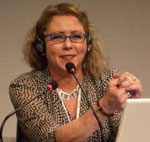 | | Tracey Naughton (Radina Fulgaradi) |
NGOs and other members of civil society were organised in a “family structure” - different caucuses monitored how their particular interests, for example, freedom of expression, would find their way into the documents of the Summit. In the Prepcom Meetings prior to the Summit, they lobbied friendly governments and negotiated with “unfriendly” governments, such as China (a country where media freedom is limited and Internet access is strictly censored) in a bid to shift their positions.
Although various “unfriendly” governments tried to restrict civil society from plenary sessions, the groups eventually received time slots to air their concerns. Of these harsh measures, Naughton says, “I think some governments have almost taken civil society more seriously than civil society has taken itself.”
According to Luckson Chipare, Regional Director of the Media Institute for Southern Africa (MISA), other measures to restrict the participation of civil society included the fact that although some African governments invited the interested parties, they were not willing to finance their travel, resulting in a low civil society turnout.
Is the Internet a guarantor for information and development?
Although organisations such as Highway Africa and certain civil society groups benefited from the meeting, others are displeased about its outcome. Julien Pain from the Internet Freedom Desk of Reporters without Borders sees a lack of credibility in the Tunisian Summit. “President Ben Ali of Tunisia doesn’t allow any political opposition, nobody can criticise Ben Ali, not even on the Internet. This is even more absurd when you consider that they organised a summit about the Internet.”
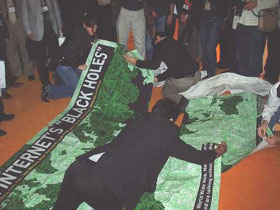 | | RSF demonstration at WSIS (Bill Thompson, 2005) |
Apart from the fact that Tunisia belongs to the worst Internet censors, the Tunisian authorities also prohibited a Citizen’s Summit of civil society groups to take place in the centre of Tunis. The organisers eventually had to settle for a press conference at the premises of the Tunisian Human Rights League, followed by a demonstration on the last day of the Summit in support of some political opponents.
Bearing these incidents in mind, Pain feels that the issue of freedom of expression and access to information has not been thoroughly addressed at the Summit. He cites an incident whereby participants were resistant to critique. “Each time I went, for example, to the Vietnamese delegation and said to them: ‘You jail people and you censor the Internet,’ they always refused to talk to us,” he says.
In response, Reporters Without Borders launched a list of 15 enemies of the Internet - the worst countries in terms of censorship on the world wide web (see www.rsf.org). The issue of freedom of expression lead to conflicts not only with some journalists, but also with some civil society caucuses. This eventually resulted in a heated discussion by the Tunisian participants, leading some to believe that they had been infiltrated by the Tunisian government. (see also: Audio: Interview Tracey Naughton).
Who rules the Internet?
Also discussed at the Summit was the issue of Internet governance. Until now, the so-called Top Level Domains such as ‘org’ for the Internet space of organisations or ‘nl’ for countries were distributed by the Internet Corporation for Assigned Names and Numbers (ICANN). Since the private organisation has a contract with the US-Trade Ministry, some countries wanted an end to US control over Top Level Domains.
The compromise agreed on in Tunis is a multi-stake holder forum connected to the United Nations Secretary General. The forum will have an advisory status on technical questions of the Internet and will, in addition, create space for discussions on cyber crime or development issues. The solution, though not comprehensive enough for some, was in general welcomed by all participants.
Paul Twomy, president of the ICANN, says: “We are all winners with this solution.” He points out that the more technical aspects for the Internet to run on a daily basis were now guaranteed, leaving the control with ICANN.
On the other hand, civil society groups have also had one of their suggestions approved. During the first phase of the WSIS 2003 in Geneva, they proposed a multi-stake-holder forum. MISA’s Chipare calls the forum a “noble initiative,” but also warns that if civil society interests are not implemented and followed up, the forum might be no more than a mere window dressing.
Steps ahead for the information society
But what will happen after Tunis? How can the ambitious goal of having half of the world’s population online by 2015, and speeding up development of certain counties through use of ICTs, be reached?
Chipare recommends that civil society use the Tunis Commitment, as well as statements of heads of governments, as lobby tools. The Botswana government is a case in point. Botswana plans to draw an Access to Information Law. The Tunis Declaration and statements made by Botswana in the Political Chapeau could assist as a lobby tool in the process of drafting that legislation, says Chipare.
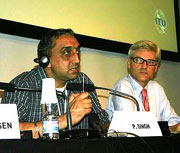 | | Parminder Jeet Singh and Berrand de la Chapelle at a discussion panel at WSIS (Rik Panganiban, rikp@earthlink.net) |
Furthermore, worries that the Summit’s resolutions might disappear within the UN system were also expressed. “The whole issue of mechanisms for follow-up and implementation was only really beginning to be addressed three months before the Tunis Summit,” Bertrand de la Chapelle, from the WSIS Civil Society Bureau, complains (see Audio: Interview Bertrand de la Chapelle/ Paraminder Jeet Singh).
The discussion not only started late, but many countries were actually opting for no follow-up mechanisms at all.
Members of the Follow-Up Group also lamented the fact that the body chosen to be responsible for the follow-up, the Commission for Science and Technology, is a sub-group of the Economic and Social Council (ECOSOC) of the United Nations. “Through giving the follow-up function to this Commission, we take a very technology-centred view on the information society, whereas we see the information society as a very complex social-political phenomenon,” says Parminder Jeet Singh from the Indian organisation “IT for Change”.
Chances are however, that development issues will find more space when the mandate of the Commission is enlarged in July 2006. Much will depend on pressure from civil society. Ralf Bendrath, political scientist and member of the drafting group for the civil society statement, elaborates: “What is important now is that our huge network covering various topics will not fall apart. That will be a challenge.”
Kabwato from Highway Africa hopes that donors will not only find it fashionable to support projects bridging the digital divide because the term is now en vogue. “I think there is need for consistency”, he says, “political will is important, but also the issue of sustainability.”
Follow-up will therefore also be given during the Highway Africa Conference in September 2006.
| |
|
|
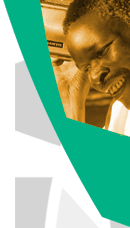
|
 |  |  |  |
|

